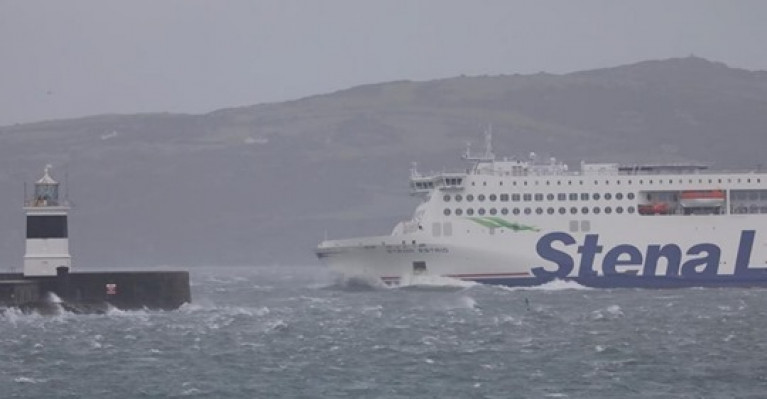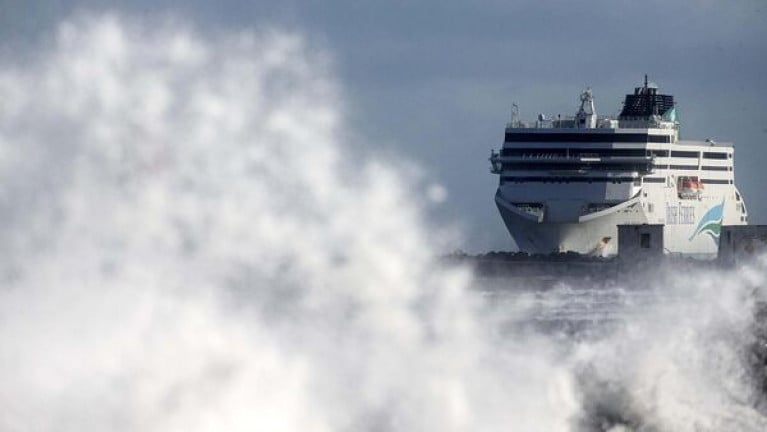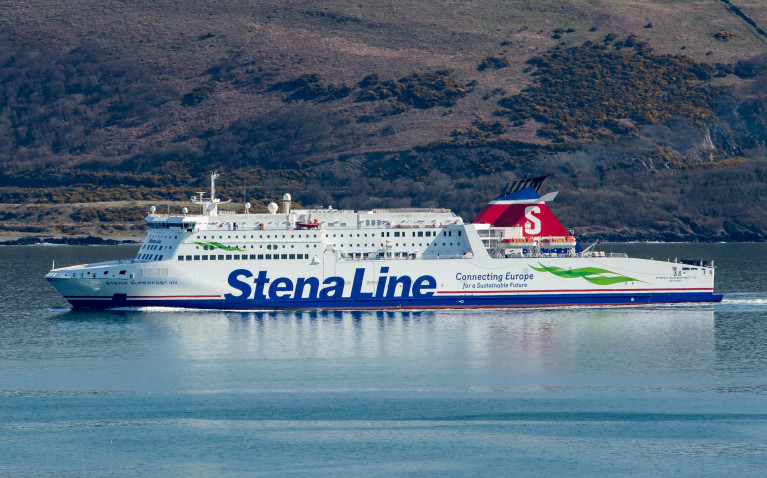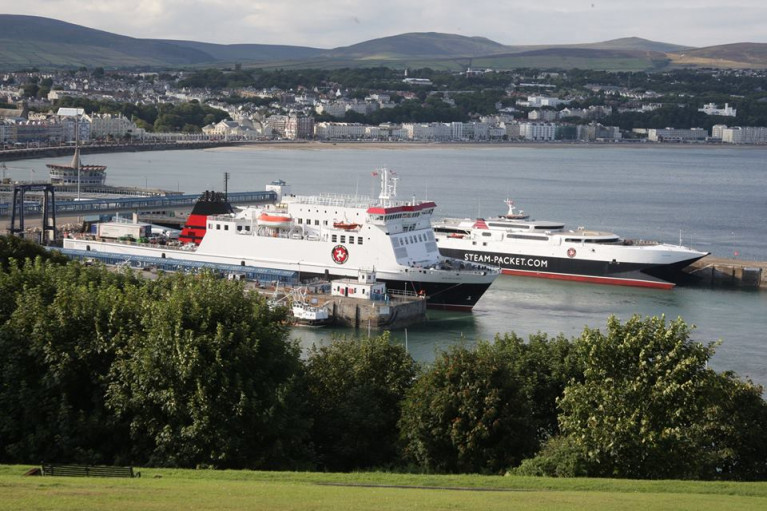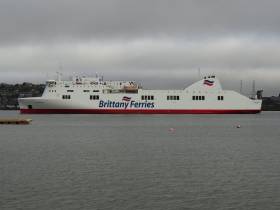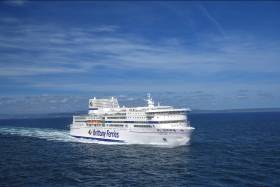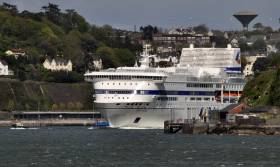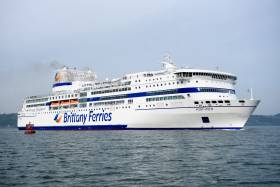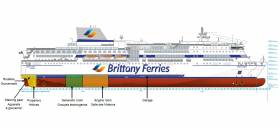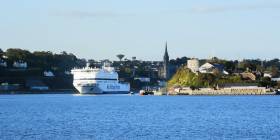Displaying items by tag: Cancelled Sailings
Ferries & Flights Cancelled as Storm Eunice Moves Across Ireland
Several ferry crossings and flights have been cancelled as Storm Eunice tracks across Ireland.
Gusts of more than 130km/h have been reported in some areas, and thousands of homes and businesses have been left without power.
(For more on coverage of flights see also the RTE News report)
A number of ferry sailings to the UK, France and Spain from Rosslare have also been cancelled. All intending ferry and air passengers are advised to check what is going ahead with whoever they are booked with.
ESB Networks has said that 80,000 customers are now without power nationally.
In addition to read more on the weather situation nationwide click here.
Ferry Companies Cancel Calf Shipments to France this Week
Two ferry companies sailing from Ireland to Cherbourg, France, have confirmed they will not bring livestock lorries on sailings scheduled for this week.
Both Irish Ferries and Stena Line have confirmed to Agriland.ie that they will not carry livestock for health and safety reasons due to Storm Dudley and Storm Eunice.
One ferry company representative said that the Cherbourg sailing (Thurs, 17 Feb) has been cancelled, adding that the weekend sailing “definitely wont be taking livestock” and may be “cancelled altogether” due to the storms.
These developments will put further pressure on traders selling calves to mainland Europe as it delays the supply of calves by a week.
More here on this story.
Sailings On Stena Scotland Service Cancelled after Positive Covid Test
Operator Stena Line cancelled four of its ferry sailings between Scotland and Northern Ireland after one crew member tested positive for Covid-19.
Its 19:30 BST departure from Cairnryan and 23:30 BST departure from Belfast were cancelled on Wednesday.
On Thursday, the same incident led to the company calling off its 03:45 BST departure from Cairnryan and its 07:30 BST departure from Belfast Harbour.
"We apologise to our passengers for the inconvenience," Stena said.
The company said it had acted in accordance with its "comprehensive safety protocol procedures".
BBC News has more.
Sailings Cancelled As Silt Builds up in Douglas Harbour
Ferry sailings of the Isle of Man Steam Packet were called off for the ro-pax Ben-my-Chree.
Sailings to and from the Island, reports Manx Radio, have been cancelled due to silt build up in Douglas Harbour.
The Steam Packet Company has pulled the 8.45am, Ben-my-Chree, crossing to Heysham and the return journey at 2.15pm.
It says the silt combined with an extremely low tide is to blame.
Overnight sailings were also affected with the Ben-my-Chree delayed leaving Heysham.
It's due back to Douglas at 10am, meaning today's newspapers will be late.
Sailing for 300 Passengers Cancelled Hours Before Brittany Ferries Crossing
Some 300 passengers and their travel plans have been disrupted this weekend, reports the Irish Examiner, following the last-minute cancellation of Brittany Ferries sailings between Cork and Santander.
Passengers received texts (yesterday) morning advising that tonight's 10.30pm ferry from Ringaskiddy, Co. Cork to Santander in northern Spain, was cancelled due to a technical problem.
One passenger, Bernice Russell, from Cork, said initially they were told the ferry would leave instead at 9am on Saturday morning, but that too was cancelled.
For more on this story click here.
Afloat.ie adds that the next sailing on the year-round route to Spain scheduled for next Monday has too been cancelled as according to Brittany Ferries. For the latest information this can be found on the operator's sailing updates page by scrolling down for Irish routes.
Afloat.ie also adds that the ferry concerned the Connemara had to vacate the single-linkspan at Ringaskiddy so to enable fleetmate Pont-Aven to berth at the terminal as it operates the Cork-Roscoff route at the weekends. The flagship is scheduled to depart to France today at 16.00hrs.
As for the whereabouts of the Connemara, the 500 passenger capacity ropax proceeded upriver of the River Lee to the Marino Point jetty which as Afloat previously reported is to be redeveloped.
Customers in their thousands due to travel with Brittany Ferries are facing holiday disruption with the company's flagship Pont-Aven ferry now out of action until June 14.
The cruise-ferry, writes Independent.ie, which sails from Cork to Roscoff in France, has been out of service since May 17 to facilitate repairs to a fault.
"Despite these efforts it has now become apparent that this work will take longer than initially planned, whilst replacement parts are delivered and installed, and comprehensive checks are carried out," the company has announced.
The Pont Aven will not resume sailings until Friday, June 14.
For passengers, that means sailings on the Cork/Roscoff route have been cancelled for this weekend (May 31/June 1) and next (June7/8), along with a number of sailings on the company’s Plymouth/Santander and Plymouth/Roscoff routes.
Since May 17, a total of some 6,500 customers will be affected.
For more on the story click here including a Q&A link about what are my rights if my ferry is cancelled or delayed?
The operator of the Cork/Roscoff route, Brittany Ferries regrets its flagship cruise-ferry Pont-Aven, which has been out of service undergoing repairs since Friday 17th May, will now not be able to resume sailings until Friday 14th June.
As a consequence the company in a statement has confirmed Pont-Aven's sailings on the company’s Cork/Roscoff route have had to be cancelled this weekend (Friday 31st May and Saturday 1st June) and the following weekend (Friday 7th and Saturday 8th June).
In addition to a number of cancelled sailings (albeit based out of the UK) on the company’s Plymouth/Santander and Plymouth/Roscoff routes.
The company’s technical teams have been working around the clock with the Damen shipyard in Brest to carry out repairs to the ship’s starboard-side steering gear (Afloat adds this follows a separate incident that took place late last month). Despite these efforts it has now become apparent that this work will take longer than initially planned, whilst replacement parts are delivered and installed, and comprehensive checks are carried out.
“On behalf of everyone at Brittany Ferries I would like to apologise profusely for the further delays to the return of our flagship Pont-Aven, and the disruption that this will cause to travel plans. It’s a frustrating situation, but our priority now is to contact all customers who will be affected by this situation and to make sure that we look after them as best as we can.” said Christophe Mathieu CEO Brittany Ferries.
In order to give affected customers the best possible opportunity to arrange alternative sailings, additional sailings will be operated on the Plymouth/Roscoff route, and some Cork/Santander rotations will be diverted to Cork/Roscoff.
Over the coming days the company’s customer relations teams will be contacting all customers with bookings aboard Pont-Aven for travel between now and 14th June. Those who are due to sail soonest will be contacted first. An alternative sailing will be offered where it is available, but if no suitable alternative is available then a full refund will be offered. Due to the exceptional number of phone calls involved, affected customers are kindly requested not to call, but to wait to be contacted by Brittany Ferries.
For further updates they will be posted online (click here) on the operators website.
More Ireland-France Sailings Cancelled As Brittany Flagship Is Off Service for Repairs
Brittany Ferries have been forced yet again to cancel sailings on its Cork-Roscoff route due to operational reasons as flagship Pont-Aven continues to be beset with technical issues, writes Jehan Ashmore.
Currently Pont-Aven remains in dry-dock at Damen Shiprepair, Brest, following an hydraulic problem which took place in mid-May while on a sailing from the UK to France.
The incident led in turn to cancelled sailings on the Ireland-France route where affected passengers to date and next weekend (1 June) have been offered to defer the sailing to a later date (subject to availability) or cancel and receive a full refund.
Brittany Ferries are in the process of assisting customers and await a confirmed date of Pont-Aven's return (see updates) in addition the operator have taken the precaution of blocking any further bookings on cruiseferry between now and 7 June.
Communication of developments will also be made as soon as possible via our sailings update page.
An in-depth investigation has begun by the French operator into the incident.
Commenting about the incident Christophe Mathieu, Brittany Ferries CEO who said “We are all truly sorry for the further problems with our flagship vessel Pont-Aven. Unfortunately she has suffered two technical problems in rapid succession. While the previous engine problem, which reduced the ship’s speed from 24 knots to 20 knots, is entirely unrelated to the current steering gear issue, the consequence of further bad luck is significant inconvenience for our passengers."
The German built Pont-Aven is fitted with two entirely independent Rotary Vane steering gears, each operating one of two rudders. These are self-contained units positioned at her stern directly above the rudders . Hydraulic oil is injected at high pressure into a series of chambers which operate the rotating part of the steering servo-motors. As these chambers fill, the rotor turns, thus moving each rudder in the desired direction.
According to Brittany Ferries, Pont-Aven’s engineers were alerted to low oil pressure in the starboard steering gear. An oil leak was identified which caused the pressure loss and a reduction in steering capacity. Under these circumstances, the decision was immediately taken to take Pont-Aven out of service in Roscoff, for investigation and remedial work to be carried out in Brest.
Unfortunately, following further investigation it was found that damage to the starboard side steering gear was more extensive than originally suspected. This has meant a longer lay-over in Brest than originally planned to source replacement parts and carry out a comprehensive repair.
A repair procedure has been defined with the agreement of Bureau Veritas (certification authority) and the manufacturer. In parallel, a complete check of the port steering gear has been carried out.
Cancellations of four Brittany Ferries services to and from Cork is unfortunate but the onus has to be to look after the passengers affected, according to chief executive of the Irish Travel Agents Association Pat Dawson.
As Echolive.ie reported (yesterday's) ferry from Cork to Roscoff in northern France was cancelled due to a technical problem with the vessel, Pont-Aven, while a separate issue with the Connemara vessel between Cork and Santander in northern Spain meant that this voyage was also not running on Friday.
Almost 1,500 passengers were affected by the cancellations.
Speaking to The Echo, Mr Dawson said: “These things happen in all walks of life. There isn’t much you can do about it, but when something like this goes wrong, all you can do is look after those affected.”
Mr Dawson said all passengers who were supposed to board the ferry to France or Spain with Brittany Ferries are entitled to compensation under the Flight Compensation Regulation 261/2004 which governs flights and ferries in terms of cancellations.
Click here for further reading on this story.
For the latest update on Pont-Aven (including passenger FAQ) in addition to status of sailings including those on UK (Plymouth)-Spain service click here
Several scheduled sailings the Irish Examiner reports between Cork and mainland Europe have been cancelled by Brittany Ferries.
All planned sailings to and from Roscoff, France have been cancelled until May 31.
The routes affected are Roscoff to Cork tomorrow, May 24, and Cork to Roscoff on Saturday.
The cancellations are due to "a technical problem with the Pont-Aven ferry," according to the company.
Brittany Ferries has apologised for any inconvenience this has caused and in a statement said customers affected are being offered a full refund or an alternative sailing.
"Brittany Ferries sailings from Roscoff-Cork (May 24) and Cork-Roscoff (May 25) have regrettably been cancelled due to a hydraulic fault on the Pont-Aven affecting its rudder, the repairs for which have taken longer than first anticipated," a spokesperson said.
"We are currently contacting all passengers scheduled to travel the route tomorrow and Saturday to offer assistance.
To continue reading this story (click here) on the 40,000 gross tonnnage cruiseferry which is currently dry-docked in Brest at Damen Shiprepair.
Afloat adds Armorique (see above photo) previously deputised on the Ireland-France service also this month because Pont-Aven had another incident during a crossing between the UK and Spain. This necessitated a detour to Brest from where passengers were safely disembarked.
On that occasion Pont-Aven used the same dry-dock in Brest to undergo repairs.
As for Armorique, this cruiseferry routinely serves on the English Channel between Portsmouth and Caen (Ouistreham). The ferryport in Normandy is adjacent to the beach (codenamed 'Sword') which formed part of the Allied invasion when the D-Day Landings took place on 6th June 1944.
Commemorative services to mark the 75th anniverary of that momentous day will be held in less than fortnight's time.



























